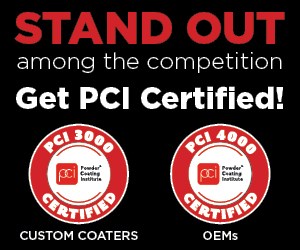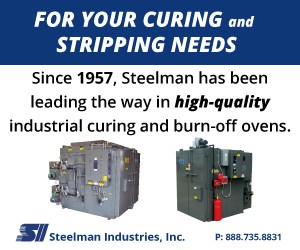Pinholes in Epoxy
What causes pinholes in epoxy-powder-coated bars after curing?
Q. We are dealing with epoxy powder for insulating coating. The process is like this:
1. Cleaning of bars done by sanding and buffing
2. Pretreatment of the bars using a three-tank process
3. Preheat or dry-off oven to remove moisture
4. Automatic electrostatic spray booth
5. Curing oven
After the bars come out of the cure oven, they are tested for pinholes in the coating. We do a flash test using 2.5 kV. Since last month, we have started getting more pinholes in our bars (ranging from 2 - 10 percent). This level of pinholes is very bad news for us. I need your suggestions for what we can do to overcome this. —G.H.
A. Pinholes could be caused by substrate contamination, outgassing or substrate temperature. Make sure the part is clean and dry before coating. Make sure your rinse water is clean and that there are no drips leaving salt mineral deposits on the part. Check for outgassing, which could be caused by brazing material, plating, or bends in the part. You also may be able to get some relief by preheating the part to thermally remove contamination and relieve trapped air pockets. If the metal is too cold or too hot it can also cause pin-holes. Finally, a cure temperature that is too hot can cause pin-holes.
The fact that the pinholes are mostly along the lower edge suggests that something is running down the bar during pretreatment and building up along that edge. I would review the pretreatment process and try to improve your cleaning and rinsing. If you are using a poor quality rinse water, replace it with deionized (DI) water or water filtered by reverse osmosis (RO). DI or RO water will help ensure removal of all residual minerals at the end of the washer.
Related Content
-
TTX’s Automated Conveyor Carrier System Offers Wireless, Flexible Operation
ACC system designed for reliable, consistent point-to-point movement of everything from small to heavy parts.
-
Masking Solutions Provider CFS Dramatically Expands Capabilities and Capacity
Custom Fabrication & Supplies (CFS) completed a new plant expansion packing 10 times the capacity into twice the space. It dramatically enhances the supplier’s custom capabilities to provide extremely precise and cost-effective masking solutions.
-
Curing Oven Basics
Simply heating up the substrate does not cure the coating. There are many variables to consider when choosing the best cure oven for your application...
















